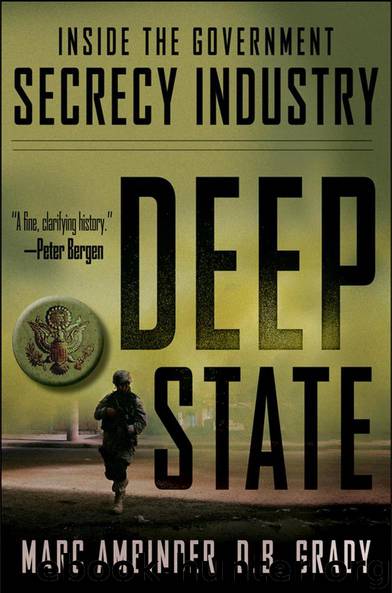Deep State: Inside the Government Secrecy Industry by Marc Ambinder & D. B. Grady

Author:Marc Ambinder & D. B. Grady
Language: eng
Format: mobi
Tags: American Government, Public Affairs, Political Science
ISBN: 9781118146682
Publisher: Wiley
Published: 2013-04-01T04:00:00+00:00
is quite good, and he doesn ’t get much credit for it. A billion docu-
ments were bulk-declassifi ed during his tenure. Similarly, there were
few leaks of sensitive information—and there was plenty of sensi-
tive information to be leaked, including virtually everything about
Clinton ’s secret war against al-Qaeda. 17 But habits remained hard to
break. John Podesta, one of the architects of the modern Freedom
of Information Act (FOIA) law and one of Clinton ’s chiefs of staff,
recalls a battle he “won once out of every ten times.” He said,
“Sometimes, someone from the NSC would come into my offi ce
and hand me a newspaper article from overseas. It was marked ‘C’
for Confi dential. I was quite an asshole about this, I admit,” he said.
“I would go to the NSC executive secretary down the hall and ask,
‘Why is this classifi ed at all? It ’s a newspaper article.’ Then inevitably
they would come back and say, ‘It ’s classifi ed because the president ’s
interested in it and that is strategic information.’ Okay. Yeah, right.”
The FOIA is an effective counterweight to government secrecy. It
is also a much-abused law, overburdened by communities of conspir-
acy theorists who overwhelm FOIA offi ces with requests for informa-
tion on space aliens and such. This frustrates professional historians
and reputable transparency advocates, whose FOIA documents are
simply added to the back of the not inconsiderable queue.
By design, the FOIA process is cumbersome for both the peti-
tioner and the government. To ensure that no actively sensitive
material is released, an FOIA offi cer must often submit the request
to colleagues at multiple agencies for review. And though there are
written standards defi ning what exemptions are appropriate, every
federal agency interprets them differently. This inconsistency, espe-
cially concerning matters of national security, frustrates researchers,
and comes back to the fundamental question of what exactly consti-
tutes harm to national security and who gets to decide? And if differ-
ent people given interpretive authority make different conclusions on
c13.indd 172
05/02/13 2:49 PM
THE STRUCTURE OF SECRECY 173
the same data (inter-rater disagreement, as sociologists call it), does
that not undermine the intellectual edifi ce of both the FOIA process
and national security classifi cation itself?
The National Security Archive at George Washington University
has made a sport out of fi nding examples where one government
agency considers something too sensitive to declassify, oblivious to
the fact that another agency has already released the material. For
example, many Cold War–era memos related to missile defense
and nuclear war planning have been held back by the Defense
Department, even though many have not only been declassifi ed but
actually published by the government in offi cial, unclassifi ed his-
tories. The problem, as university researchers see it, is that the gov-
ernment refuses to establish uniformly enforceable standards for
historical and legacy information and often refuses to revisit earlier
classifi cation decisions. According to William Burr of the National
Security Archive, “Neither historians, taxpayers, nor the secrecy sys-
tem itself are well served when declassifi cation reviewers treat histori-
cal classifi ed information in the same way as today ’s secrets.”
The more secrets an agency holds, the better it is at frustrating
the FOIA process, intentionally or otherwise.
Download
This site does not store any files on its server. We only index and link to content provided by other sites. Please contact the content providers to delete copyright contents if any and email us, we'll remove relevant links or contents immediately.
The Secret History by Donna Tartt(19002)
The Social Justice Warrior Handbook by Lisa De Pasquale(12177)
Thirteen Reasons Why by Jay Asher(8874)
This Is How You Lose Her by Junot Diaz(6857)
Weapons of Math Destruction by Cathy O'Neil(6248)
Zero to One by Peter Thiel(5767)
Beartown by Fredrik Backman(5717)
The Myth of the Strong Leader by Archie Brown(5482)
The Fire Next Time by James Baldwin(5409)
How Democracies Die by Steven Levitsky & Daniel Ziblatt(5200)
Promise Me, Dad by Joe Biden(5130)
Stone's Rules by Roger Stone(5065)
A Higher Loyalty: Truth, Lies, and Leadership by James Comey(4937)
100 Deadly Skills by Clint Emerson(4900)
Rise and Kill First by Ronen Bergman(4761)
Secrecy World by Jake Bernstein(4727)
The David Icke Guide to the Global Conspiracy (and how to end it) by David Icke(4685)
The Farm by Tom Rob Smith(4489)
The Doomsday Machine by Daniel Ellsberg(4474)
